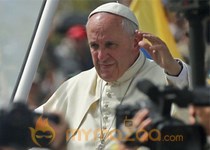Paramedics treated more than 20 people for hypothermia after a pre-dawn torrential rain doused a crowd of several hundred thousand waiting to hear Pope Francis speak in Ecuador.
City Operations director Cristian Rivera said the water-logged crowd received blankets from emergency workers as they awaited the second Mass of the Pontiff’s South American tour.
Two hydrosuction trucks worked to remove puddles from several inundated sections of the park, Rivera said.
A 59-year-old seafood vendor, Abel Gualoto, rubbed his cold hands and said he didn't mind the discomfort.
"The joy at seeing the pope gives us the warmth we need," he said.
When he arrived, Francis told the estimated half-million people gathered Tuesday that in a world divided by wars, violence and individualism, Catholics should be "builders of unity," bringing together hopes and ideals of their people.
He said: "There was no shortage of conviction or strength in that cry for freedom which arose a little more than 200 years ago. But history tells us that it only made headway once personal differences were set aside."
The Mass featured readings in Quichua, the native language most spoken in Ecuador, and Ecuadorean vestments for the pope.
Meanwhile, Ecuador's largest indigenous association is complaining that it was left off of Pope Francis's agenda during his visit to the country, where the group has been at odds with President Rafael Correa.
The head of the Confederation of Indigenous Nationalities, Jorge Herrera, said Roman Catholic Church officials never responded clearly to the group's request to meet directly with Francis during his three days in the country.
"It seems we're not being permitted a direct voice," he said late Monday.
The pope has made outreach to indigenous people a persistent theme during his three-nation South American tour. He has said indigenous peoples are the most vital stewards of the environment and the group most hurt by the ravages of deforestation and contamination by petroleum and mining industries.
The confederation, known by its Spanish initials as CONAIE, believes that for that reason, Francis should grant it privileged status during his three days in Ecuador.
The pope had no events in the country specifically aimed at indigenous people, though a lector at Tuesday's papal Mass in Quito delivered a reading in its dominant native tongue, Quichua.
In addition, 20 indigenous delegates were invited to a Tuesday night meeting with the pope that includes an array of "civil society" organizations, from business to sports to cultural figures
CONAIE has clashed with nearly every Ecuadorean government since it was founded in 1986, and its street mobilizations helped topple a president in 2000. It has been battling Correa's effort to expand mining and oil drilling in the Amazon and several of its activists have been jailed for their roles in the protests.
Vatican planners generally try to avoid political provocations of a host government and usually are showered with requests for a meeting with the pontiff.
Ecuador's 18 indigenous groups -- dominated by the Quichua to which Herrera belongs -- account for at least a third of the country's 15 million people. However, only about 1 million identified themselves as such in the country's 2010 census.







